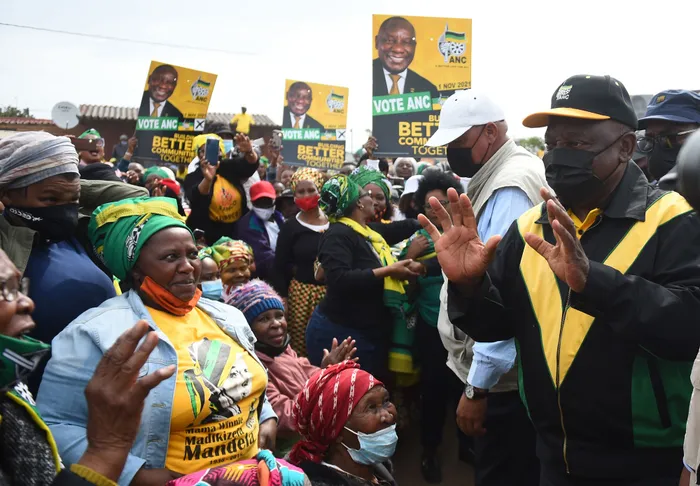Time for ANC to walk the talk on ‘leader of society’ claim

Picture by Phando Jikelo/African News Agency (ANA) - ANC supporters including senior citizens from Ward 93 in Green Point and Qandu-Qandu informal settlement in the Western Cape, South Africa greet party president Cyril Ramaphosa as he arrives to address them.
By Professor Sethulego Matebesi
THE recent completion of the ANC elective conference in Gauteng, with Panyaza Lesufi elected as the new provincial chairperson, may have brought a sigh of relief for many in the party.
The Gauteng elective conference was the fifth of the ANC, and it is, of course, no use reminding readers that it went along the same trajectory as others: delays, disorder, and leaders more concerned about their egos.
A series of chaotic scenes at the other ANC provincial conferences – and experiences of the past few years – should have led to measures that could prevent such situations. Undoubtedly, many ANC national executive committee members and rank-and-file cadres long for more peaceful and seamless elective conferences. Such an ideal situation, however, competes with who will be holding a particular position of authority within the organisation, which is one of the primary purposes of the elective conferences. And this is the reason why these events are so highly emotional.
Recent outcomes of provincial elective conferences may have provided supporters of President Cyril Ramaphosa with certainty that he is set for a second term. However, revelations such as the Phala Phala game farm saga and a scathing judgment by the South Gauteng High Court on Marikana are of concern.
At this point, one risk for the CR17 camp that is widely known and does receive the necessary attention is the potential power of the radical transformation (RET) group. At this stage, the behind-the-scenes counter-strategy is a "fit-for-purpose’’ one, aiming to manage rather than antagonise opponents. Brace yourself, South Africans. The following five months are going to be long. You can expect more scandals to be revealed against Ramaphosa or attacks against anyone and anything that stands in the way of those who want to lead the ANC at all costs. And let us not forget the possible attempts to stifle
Ramaphosa’s implementation of the recommendations of the Commission of Inquiry into Allegations of State Capture. Added to the woes of Ramaphosa are the challenges of load shedding, high unemployment, and the increasing cost of living facing ordinary South Africans. Addressing these socio-economic challenges can be easily handled by rhetorical public announcements. But addressing scandals that beg serious questions about the morality of someone who aspires to continue to lead South Africa will require much more intrinsic conviction than erratic responses to serious allegations.
The countdown to the ANC elective conference in December has unofficially begun. At the core of Ramaphosa’s thinking of how to root his democratic legitimation is to borrow the words of Herbert George Wells when he stated: “In politics, strangely enough, the best way to play your cards is to lay them face upwards on the table." Now, more than ever, the race towards the ANC elective conference is not only about its current leader. There is a need for the organisation to demonstrate to South Africans that it is indeed the leader of society, as it will not be long afterwards that the country will hold its general elections in 2024.
One task that will face any ANC leader elected as president of the party after the elective conference will be to arrest the decline in electoral support. However, it is up to the party’s current president to adopt a realist, complete, committal, and non-interest-based approach. But individual ANC leaders can only learn the lessons of previous failures if the organisation understands the need to consider and foster an environment conducive to cultivating a culture of honesty and integrity among its leaders.
Thus, it is upon Ramaphosa to ensure that his renewal campaign becomes an organisational commitment that, in turn, can engender the kind of political trust that can arrest the decline of faith in the ANC.
Whatever happens between now and the elective conference of the ANC – particularly in terms of the strategies adopted by those aspiring for a political seat within the party – there is a need for all ANC members to confront the question of trust responsibly. These are minor points but crucial for the survival of the ANC. And as the saying goes, brave leadership is about being vulnerable and courageous enough to exert influence. Only time will tell whether the ANC sees these qualities in Ramaphosa for him to lead the party for the next five years.
Matebesi is an Associate professor and the head of Sociology at the University of the Free State
Related Topics: